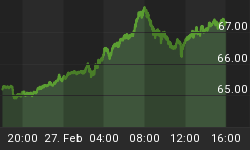Today, the Federal Reserve announced a third round of quantitative easing. Though I hesitate to call it a 'round' at all, as it is really a pledge to continue purchasing mortgage-backed securities for as long as it takes to satisfy the FOMC that growth has returned. It's really more of a Q-Infinity. This should put to bed any lingering sentiment that Chairman Bernanke had a master plan and secret exit strategy to extricate the US economy from permanently accommodative policy. Rather, his plan has always been to use money-printing to prolong the low-rate economy as long as possible. In short, if Bernanke is forced to turn off the spigot, it will be from outside forces - not his own good judgment.
This charade has gone on long enough that the Fed's own justifications have lost internal consistency. In the latest announcement, persistently high unemployment and flatlining GDP figures were named as the culprits justifying further measures. But the solution proposed is to buy $60 billion of mortgage-backed securities (MBS) per month. How did mortgages get involved?
It is well-known that the Fed has run out of traditional tools to conduct monetary policy: the fed funds rate is near-zero and the Fed now buys a supermajority of new Treasuries. Still, it rings odd that they would focus on the mortgage market exclusively. That is, unless the Fed is trying to kill two birds with one stone: juice the broader market and prevent an embarrassing backslide in the housing market, which, as recently as Jackson Hole, Bernanke claimed was stabilized by the Fed's interventions in 2008.
Indeed, this announcement, taken together with Bernanke's Wyoming apologia, should be interpreted by everyone as an acknowledgement of the failure of past efforts to revive the bubble economy of the '90s and '00s. The Fed essentially wrote itself a blank check and more-than-tripled the number of dollars in circulation. The stated goals were to reduce unemployment, revive investment, and prevent the collapse of the housing market. But as students of the Austrian School understand, the Fed cannot accomplish any of these goals in the long-term. The best it can do is re-allocate capital from future to present consumption by creating false market signals. In plain English, it can trick us into acting like there's prosperity while the economy suffers. In this way, they are so much like the house flippers that sprung up during the '00s, hoping to cover a dilapidated house in a fresh coat of paint and re-sell it for a handsome profit. That may work for awhile, but as the house leaks and crumbles, people get wise to the ruse.
Investors are getting wise to the Fed's ruse. In response to today's announcement, gold and silver shot upward while Treasuries slid back. In the past, QE held the promise to many of a US revival. Now, it's just seen as hastening the inevitable.
The Fed has pledged to buy $60 billion a month of MBS until as late as mid-2015. That's a total value of just over $2 trillion. This means the Fed intends to buy 25% of entire mortgage-backed securities market, and in the process increase the monetary base another by 75% from today's astronomical levels. And they suggest that's only the beginning. They will keep printing and buying, they say, until "a considerable time after the economic recovery strengthens." [2]
Given this incredible pledge, the shock today is really that markets haven't reacted more sharply. US stock investors may be factoring in the more difficult business environment that comes along with higher inflation, even though they can expect their securities to rise in nominal terms. But precious metal and bond investors have no excuse to be playing wait-and-see. The Fed has posted a clear, neon, flashing sign that the dollar destruction policy is here to stay. All else being equal, that means escalating prices for hard assets and tumbling prices for fixed-return, dollar-denominated securities. While this torrent of new dollars will eventually send prices for all assets up in nominal terms, we will quickly learn that nominal values are only worth the paper they're printed on. In the era of Q-Infinity, the winners will be those who can identify and hold fast to real value.















